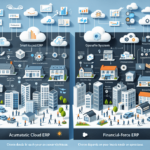Microsoft Dynamics 365 Business Central vs Acumatica Cloud ERP
Choosing the right Enterprise Resource Planning (ERP) system is crucial for your business's efficiency and growth. Two leading contenders in the market are Microsoft Dynamics 365 Business Central and Acumatica Cloud ERP. This comprehensive comparison explores their features, pricing, customization options, and more to help you make an informed decision.
Key Differences Between Microsoft Dynamics 365 Business Central and Acumatica Cloud ERP
Pricing Models
Microsoft Dynamics 365 Business Central utilizes a consumption-based pricing model, allowing businesses to pay for the functionalities they use. Pricing is based on user roles (Basic vs. Full users) and includes costs for transactions and storage.
In contrast, Acumatica Cloud ERP employs a subscription-based pricing model based on concurrent users and the modules implemented. This model enables businesses to scale efficiently, paying only for the necessary functionalities.
Deployment Options
Microsoft Dynamics 365 Business Central offers flexible deployment options, including cloud-only, on-premises, and hybrid models. This flexibility caters to businesses with varying connectivity and compliance requirements.
Acumatica Cloud ERP is designed exclusively for cloud deployment, providing scalability and accessibility. While this offers agility, it may not suit businesses in data-sensitive industries or regions with unreliable internet connectivity.
Features and Functionality
Financial Management
Both ERP systems offer robust financial management modules, including accounts receivable/payable, general ledger, and cash management. However, Acumatica provides more granular control and customization options tailored to specific financial processes.
Supply Chain Management
Microsoft Dynamics 365 Business Central integrates seamlessly with supply chain functions like purchasing, inventory, and sales orders, offering an end-to-end solution.
Acumatica Cloud ERP also covers these areas but stands out with its specialized editions for distribution, manufacturing, and commerce, enhancing its suitability for diverse business needs.
Customer Relationship Management (CRM)
Business Central includes integrated CRM capabilities, such as sales, service, and project management, ensuring unified customer data across departments.
Acumatica offers CRM functionalities with a focus on customization, allowing businesses to tailor the system to their unique customer interaction processes.
Pros and Cons
Microsoft Dynamics 365 Business Central
Advantages:
- Prebuilt templates facilitate quick implementation.
- Seamless integration with other Microsoft products like Office 365, PowerBI, and PowerApps.
- Flexible deployment options including hybrid models.
Limitations:
- Pricing can become complex and potentially more expensive as additional functionalities are required.
Acumatica Cloud ERP
Advantages:
- Flexible, subscription-based pricing tailored to concurrent users and specific modules.
- High degree of customization to meet unique business processes.
- Specialized editions for industries like retail, manufacturing, and distribution.
Limitations:
- Customization may require additional time and resources for implementation and maintenance.
Cost and Licensing Comparison
The total cost of ownership for each ERP system depends on various factors, including deployment model, number of users, and required functionalities.
Microsoft Dynamics 365 Business Central
- Pricing is based on user roles (Basic vs. Full users).
- Includes costs for transactions and storage.
- Offers a consumption-based pricing model that can scale with business needs.
Acumatica Cloud ERP
- Subscription-based pricing based on concurrent users and implemented modules.
- Different editions cater to specific business requirements.
- Base pricing typically includes three users, with additional costs for more users and functionalities.
Businesses should evaluate which pricing model aligns best with their operational structure to determine the most cost-effective solution.
User Experience and Integration
Both ERP systems prioritize intuitive user interfaces and seamless integration with other applications.
Microsoft Dynamics 365 Business Central
- Familiar Microsoft-style interface integrates with tools like Excel, Outlook, and Teams.
- Enhances collaboration and productivity through tight integration with the Microsoft ecosystem.
Acumatica Cloud ERP
- Highly customizable interface that can be tailored to specific user preferences.
- Features an open API, enabling integration with external applications such as Salesforce and HubSpot.
Choosing between a standardized interface and a customizable one depends on your company's specific needs and the importance of individualized user experiences.
Integration Capabilities
Effective integration is vital for ensuring data consistency and operational efficiency across various business functions.
- Microsoft Dynamics 365 Business Central: Integrates seamlessly with Microsoft products and offers tools like Power Automate for creating automated workflows.
- Acumatica Cloud ERP: Utilizes an open API supporting REST, SOAP, and OData protocols, facilitating integration with a wide range of third-party applications.
Assessing the quality and flexibility of integration tools is essential for businesses seeking to maintain a cohesive IT ecosystem.
Security Features
Protecting sensitive financial and operational data is paramount for any ERP system.
- Microsoft Dynamics 365 Business Central: Implements industry-standard security protocols, data encryption, automated backups via Azure, and role-based access control to safeguard data.
- Acumatica Cloud ERP: Offers robust security measures, including two-factor authentication, network intrusion detection, data encryption, and redundant data storage to ensure data integrity and availability.
Both systems provide comprehensive security features, but your specific security requirements may influence your choice.
Customer Support Services
Reliable customer support is essential for minimizing downtime and ensuring smooth ERP operations.
- Microsoft Dynamics 365 Business Central: Provides phone and online support, a comprehensive knowledge base, and community forums. Support availability can vary based on service agreements.
- Acumatica Cloud ERP: Offers multiple support levels, including phone and online helpdesk, email support, a knowledge base, and access to certified VARs and independent consultants for expert guidance.
Consider the quality and accessibility of customer support services when selecting an ERP system to ensure you have the necessary assistance when needed.
Conclusion
Selecting the appropriate ERP system is a strategic decision that can significantly impact your business's efficiency, productivity, and growth. When choosing between Microsoft Dynamics 365 Business Central and Acumatica Cloud ERP, consider the following factors:
- Pricing and licensing models
- Functionality and feature sets
- Customization and flexibility
- Deployment options
- Integration capabilities
- Security features
- Customer support services
- Scalability for future growth
By thoroughly evaluating these aspects, businesses can identify which ERP solution best aligns with their unique needs, ensuring long-term success and operational excellence.




















